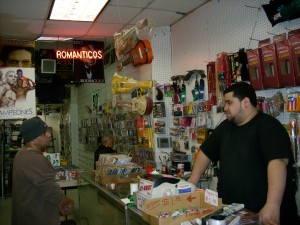Passing Elvio’s Latin cd shop on Third Avenue in Melrose, you could imagine you were back in the 1970s.

Willie Colon’s iconic salsa smash “Todo tiene su final” (Everything has an Ending) is playing onto the street over the loudspeaker. Oldsters and youngsters alike are milling over the beat-up wooden bargain bin on the sidewalk, conferring over their $4.99 cassette finds in Caribbean-accented Spanish.
But pinch yourself and you realize it’s no longer 1976, and Elvio’s will soon be gone.
By mid-March, the last of what was once a thick cluster of competing Latin music stores lining this busy street will have closed its doors; they have been replaced by sprawling discount clothing retailers and assorted furniture stores.
Elvio Baez remembers the days when his store could pull in as much as $10,000 in a week, but now he says he’s lucky when he can take in half that amount.
“The past three or four years, it’s gotten really bad,” said Baez, 36, who took over the business from his father when it moved from its former location across the street about a decade ago.
The burly Bronxite blames the downfall of Latin music retailers like himself on familiar suspects: music downloading, bootlegging and greedy record companies that overcharge for their product.
Baez’s younger brother, Ivan, 24, was manning the cash register one late February afternoon while Elvio was taking inventory out back and preparing boxes in the funereal setting of a business on the brink. CDs covered only about a third of the store’s wall space, leaving bare pegboard through most of the store. Some percussion instruments were still hanging on the walls behind the cash register.
Baez recalled his father raising him and his six siblings on a steady diet of salsa, bachata and Cuban “son” in lower Manhattan, from the era of LPs up until the days when CDs displaced vinyl.
“A lot of older people still come in, the ones who aren’t too savvy with computers,” Elvio Baez said. But he added there aren’t nearly enough older customers to help him stay afloat.
A customer was studying the old Puerto Rican country music section on the wall with rapt attention, scouting for last-minute bargains.
“I saw Celia Cruz when I was 10,” said Dinorah Rodriguez, 63, referring to the original queen of Cuban salsa. “I saw them all in person.”
“They used to bring the stars,” said Rodriguez, remembering the Teatro Puerto Rico on 138th St. and Cypress Ave in Mott Haven.
“My father got me into it,” she recalled, pointing out proudly that she now owns about 5,000 albums and CDs in her North Bronx home.
“You’ve got to understand, the only way you can go back to your childhood is through music,” continued Rodriguez, who was raised in the Bronx, but who said her grandparents used to listen to—-and sing and dance to—the old traditional music of their native Puerto Rico all the time. “You see your loved ones the way they were. Those days will never come back again.”
Elvio Baez is sanguine about the future of the Latin music business, as well as his own.
“This is all we’ve known in our lives,” he said. “I would like to get into business, but not this. I don’t think there’s a bright future for this.”
